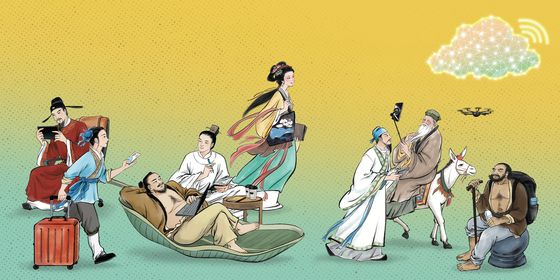Over the centuries, the character 玩 has evolved from encapsulating an appreciation for jade to describing a state of entertainment and even a lack of commitment
Over the past three decades, Friday nights have witnessed Beijing’s Panjiayuan night market transform into a bustling hub of locals and tourists alike. Jostling for precious artifacts, they ogle a variety of art, crafts, jade, jewelry, and most notably, exquisite antiques or 古玩 (gǔwán), which together showcase the unique charm of the centuries-old capital.
Part of this appreciation, and a trusted tool in the arsenal of jade hunters to separate the wheat from the chaff, is the idea of 玩 (wán). According to The Analytical Dictionary of Chinese Characters (《说文解字》), written during the Eastern Han period (25 – 220), 玩—akin to the character 弄 (nòng)—refers to the act of handling an object, specifically rubbing jade. First etched in oracle bones over 3,000 years ago, the character combines 玉 (yù, jade) and 元 (yuán). While the former indicated its original meaning, the latter shaped its pronunciation. Over time, however, the meaning of 玩 has shifted to refer to entertainment, playfulness, or the act of taking pleasure in something.
Learn more Chinese characters:
- 物: The Ox, the Earth, and the Infinite
- 游: Learn the Chinese Character for Journeys and Adventures
- 文: How a Character That Once Referred to Barbarians Now Represents Civility
Despite this evolution, the character retains its implications of appreciation. For example, careful appreciation, or 把玩 (bǎwán), often reveals a strong attachment to collectibles. This sentiment even expands to encompass gazing upon flowers, mountains, and rivers, as reflected in the term 玩赏 (wánshǎng), a sentiment captured in a zhiguai story (tale of strange) by Song dynasty (960 – 1279) scholar Hong Mai (洪迈): “Once in late spring, the lady visited a famous garden to admire peonies, accompanied by friends as they walked through a path of flowers (尝以暮春游名园,玩赏牡丹,偕侣相携穿花径 Cháng yǐ mùchūn yóu míngyuán, wánshǎng mǔdān, xié lǚ xiāngxié chuān huājìng).”
Over the centuries, 玩 has transformed from describing simple, outward physical interaction to deep, inward reflection. For example, the phrase 玩味 (wánwèi) means to savor or contemplate. This careful contemplation was well expressed by the 17th-century poet Li Yu (李渔) in relation to his writing: “Now, let me take out my poetry and consider it carefully (如今待我取出诗来,细细的玩味一番 Rújīn dài wǒ qǔchū shī lái, xìxi de wánwèi yì fān).”
Meanwhile, 玩弄 (wánnòng), originally meaning “to play with,” as in 玩枪弄棒 (wánqiāng nòngbàng), can be found encapsulated in the thrilling scenes of gun- and stick-play at the heart of many a martial arts tale. But over time, the phrase 玩弄 has also come to imply a sense of manipulation or frivolity, such as 玩弄感情 (wánnòng gǎnqíng): to trifle with other’s affections (usually leading to emotional turmoil and pain).
Sometimes, 玩 also implies carelessness or a lack of commitment. For instance, 玩忽职守 (wánhū zhíshǒu), meaning to be negligent in one’s duties, comes with a healthy dose of criticism, while 玩世不恭 (wánshì bùgōng) refers to those with a cynical attitude toward the world. Someone who uses improper means to achieve a goal would similarly be dismissed as having 玩花招儿 (wán huāzhāor).
Even within a contemporary context, 玩 retains its feeling of leisure and enjoyment. Playing video games, or 玩游戏 (wán yóuxì), can spark interest in the history and culture behind them; children’s toys, 玩具 (wánjù), have evolved from simple puzzles to game consoles over the decades; 玩兴正浓 (wánxìng zhèng nóng) captures a delightful mood that is hard to interrupt; and a well-timed joke (玩笑 wánxiào) can always help break the ice during new encounters.
Moreover, the character also describes various pursuits: Investors delving into the stock market is called 玩股票 (wán gǔpiào); photographers pursuing their passion of capturing the world is called 玩摄影 (wán shèyǐng); car racing fans enjoying the thrill is called 玩赛车 (wán sàichē); and amateur opera performers refer to themselves as 玩儿票 (wánrpiào). Those who excel at their pursuits are known as 玩家 (wánjiā), while those who treat life as a game might be criticized as 玩儿命 (wánrmìng) for their carefree and reckless spirit.
玩 also carries a notion of teasing, as captured in a scene from the classic novel Dream of the Red Chamber (《红楼梦》). When protagonist Jia Baoyu sets the rules for a dinner party drinking game, his cousin Xue Pan declines for fear of embarrassment, saying: “I’m out, don’t count me in. You guys are just trying to fool me! (我不来,别算我,这竟是玩我呢!Wǒ bù lái, bié suàn wǒ, zhè jìng shì wán wǒ ne!)
But the playful nature of 玩 can sometimes veer into turbulent waters. The Confucian classic Book of Documents (《尚书》) states that teasing others can end in a loss of morality, while indulging in physical obsessions may lead to a loss of ambition (玩人丧德,玩物丧志 wánrén sàngdé, wánwù sàngzhì). This reminds us that while entertainment can bring immense joy, you must strive to amuse yourself with mindfulness and respect—or peril may be waiting just around the corner.
玩: The Character That Tempts Both Joy and Danger is a story from our issue, “New Game.” To read the entire issue, become a subscriber and receive the full magazine.













